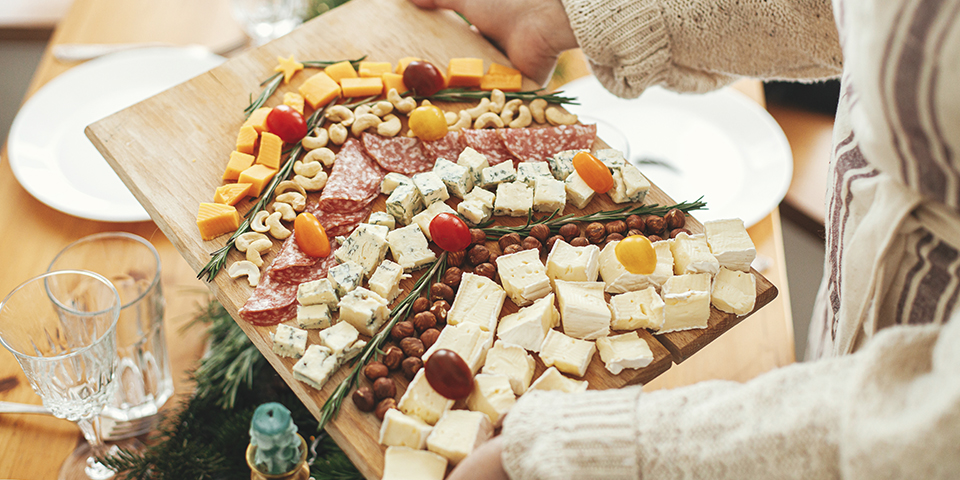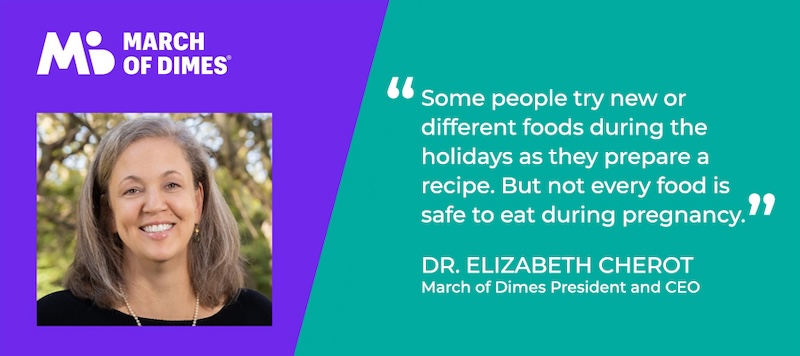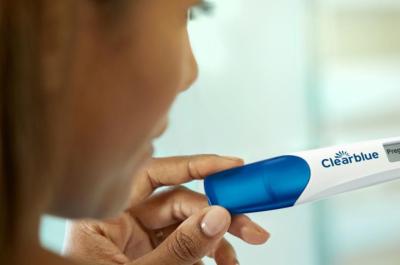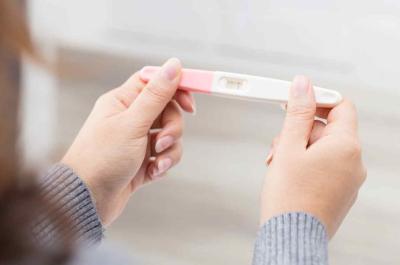Holiday foods to avoid during pregnancy and what to eat instead

Pregnancy seems to come with its own unique set of rules: You can’t eat that ahi tuna. Say good-bye to alcohol. No more deli meat for you! While these dietary guidelines are important to follow for the health of the baby, they can also make it frustrating to navigate the buffet table or bar at holiday parties. What’s a pregnant person to do? We’re glad you asked.
Holiday foods to avoid during pregnancy, plus simple swaps
Holidays are often synonymous with good food and special treats you look forward to every year. But holiday dining will likely be a bit different for you when you’re pregnant.
“Some people try new or different foods during the holidays as they prepare a recipe,” says Dr. Elizabeth Cherot, March of Dimes President and CEO. “But not every food is safe to eat during pregnancy. Some foods may be harmful to you or your baby because of the way they’re cooked or because of chemicals they contain. And pregnant people are at an increased risk of food poisoning.”
When pregnant, you may wonder what, exactly, you should avoid. Here we share some common holiday goodies you may need to skip, plus some easy swaps that won’t leave you wistful for pre-pregnancy holiday dining.

Can you drink eggnog while pregnant?
You can’t drink eggnog while pregnant if it has alcohol in it1 or if it’s homemade.2 Undercooked egg yolks may contain Salmonella.2 But if your love for this rich, sweet holiday drink is strong, we have good news: You can drink eggnog if it doesn’t contain alcohol and it’s made with pasteurized eggs. The United States Department of Agriculture Food Safety and Inspection Service requires that store-bought eggnog (made with “egg product”) be made with pasteurized eggs — simply check the carton.3 It’s also possible to use cooked eggs in homemade eggnog! Lots of recipes can be found online.
What to drink instead:
Try hot chocolate or hot tea. However, it’s probably best to avoid herbal teas. According to a 2020 study in Medeniyet Medical Journal, “Current data suggest that herbal medicinal products such as raspberry leaf, peppermint, chamomile, fennel and ginger used during pregnancy may be associated with adverse maternal and perinatal outcomes or toxicity from contaminates.”4 For example, when used in the first trimester, ginger tea has been associated with dehydration and increased nausea. If you have any questions about a specific drink, talk to your healthcare professional.4
Can you drink apple cider while pregnant?
You can’t drink apple cider while pregnant if it’s made with unpasteurized juice or fresh-squeezed juice, both of which have been linked to cases of Escherichia coli (E. coli).2 However, you can drink apple cider if it’s pasteurized or if you bring it to a rolling boil for at least one minute prior to enjoying.2
What to drink instead:
Try a mocktail (see below) or sparkling water. Or, simply heat up your cider first! If you haven’t yet made your pregnancy status public yet and don’t want to announce it by asking for boiled cider, you might say, “I let my cider get cold. Do you mind if I heat it up in the microwave for a minute or two?”
Does pregnancy-safe charcuterie exist?
Unfortunately, many of the foods found on beautifully arranged charcuterie boards are not safe to eat while pregnant. Deli meats, cold cuts and fermented or dry sausage may contain Listeria and need to be reheated to 165 degrees F before eating.2 So, your best bet is to stay clear of any meat on a charcuterie board.
You also can’t have raw-milk soft cheeses, such as brie, feta, camembert or Roquefort, unless you can confirm through the label that they are “made with pasteurized milk.”2 Finally, you should avoid unwashed raw fruits or vegetables.5 This, of course, can be tricky because no one wants to ask their host, “Did you wash these carrot sticks?” If you’re not sure, simply skip.
What to eat instead:
Feel free to nibble on hard cheeses, dried fruits, nuts and crackers from the charcuterie board. And in lieu of charcuterie, consider hitting up the shrimp cocktail! Pregnant people can enjoy 8 to 12 ounces of low-in-mercury seafood like shrimp per week.6
Can you eat stuffing while pregnant? And speaking of stuffing, what about turkey? And brisket?
According to the U.S. Food & Drug Administration (FDA), stuffing (some people call it dressing), whether it’s cooked alone or in a turkey, must reach an internal temperature of at least 165 degrees F.7 Turkey must also be cooked to an internal temperature of 165 degrees F.7 Some people may only check the internal temperature of the turkey — and not the stuffing — putting you at risk. Is brisket on the menu? If so, any form of raw beef, lamb, pork, veal steaks, roasts and chops should be cooked to at least 145 degrees F plus a three-minute rest time once removed from the heat7 (however, many people cook brisket longer to achieve a desired tenderness).
What to eat instead:
If you’re not sure if someone checked the internal temperature of stuffing cooked inside a turkey, you can always ask. And remember to load up your plate with the many other delicious sides you’ll likely have to choose from!
Can you eat raw cookie dough while pregnant?
Baking is a long-loved holiday tradition, and chances are you’ve taste-tested some dough or licked some off a spoon in the past. However, while pregnant, you shouldn’t eat raw dough or batter that contains flour or raw eggs.5
What to eat instead:
Trust the recipe and enjoy your sweet treats warm, right out of the oven.
Can you eat leftovers when pregnant?
You can enjoy holiday leftovers when pregnant if you’re quick about storing them properly. According to the FDA, “If you won’t be arriving home within two hours of being served, don’t take the leftovers home with you.”8 Also, don’t let leftovers sit in a warm car or out at room temperature.8 The key is to get anyleftovers in the refrigerator as quickly as possible. Before eating leftovers, reheat them to 165 degrees F.9
What about mocktails for pregnancy?
Mocktails, or cocktails made without alcohol, are a great choice when you’re pregnant. And the good news? They’re super popular right now. Yelp listed mocktails as one of its top 2023 food trend predictions, stating that searches for mocktails have been up 59%.10 Many restaurants and bars offer mocktails, and you can find thousands of delicious and creative recipes online. When drinking mocktails, just be mindful of the amount of sugar you’re consuming,11 and if a recipe calls for bitters, look for nonalcoholic ones.
How to handle awkward conversations when avoiding holiday foods
Between parties, open houses and big holiday meals, you’ll likely be asked at least once while pregnant, whether you’re showing or not, “Why aren’t you drinking?” or “Don’t you want to try this? It’s delicious!” Whether or not people know you’re pregnant, it’s absolutely OK to ask questions about the food and drinks being served! It’s also OK to be vague about why you’re asking. Here are some examples:
- “That hors d’oeuvre looks delicious. What’s in it?”
- “My body tends to freak out on me if I eat anything that’s not pasteurized. Do you know if these eggs are?” (This question, by the way, doesn’t necessarily reveal a pregnancy. Lots of folks can’t eat unpasteurized eggs, including those with weak immune systems.12)
- “Wow, the turkey and stuffing smell so good! I’d love to know your recipe.”
You also may find it helpful to bring a non-alcoholic drink to enjoy, snacks to combat early-pregnancy nausea or even a substitute for the main entrée. If bringing your favorite can of flavored sparkling water, pour it into a cocktail glass and no one will be the wiser. If there are lots of appetizers to choose from, no one will pay attention to the crackers or broken-up banana on your plate among some other goodies.
Finally, if you know the menu ahead of time and it’s clear you won’t be able to eat much of the food, you have a couple of options: Eat ahead of time, arrive late or simply be honest with the host ahead of time and ask if it’s OK if you bring a personal substitute dish. If you haven’t announced your pregnancy yet, simply say you’re under some dietary restrictions per your doctor’s orders. You also may just want to tell a white lie: “I’ve been indulging a bit too much lately,” or “Sorry, I can’t — I’m taking antibiotics.” No matter how you handle the situation, remember: It’s OK not to drink! While most people know it’s not polite to ask, if someone does, you can always reply with a simple, vague response: “I’m just not feeling it tonight.”
Despite the “cant’s” that come with pregnancy, there are still a lot of “cans.” Also, keep in mind that it’s OK to miss things you used to enjoy before pregnancy. Wishing you could eat or drink something you’ve always associated with a holiday or certain family members doesn’t make you a bad person. You can be excited about your pregnancy while still feeling wistful for a favorite cocktail or a bite of brie. Next year will be here before you know it.
Related Articles
Sources
- March of Dimes. Alcohol during pregnancy. Updated July 2023. Accessed September 8, 2023.https://www.marchofdimes.org/find-support/topics/pregnancy/alcohol-during-pregnancy
- FoodSafety.gov. People at risk: pregnant women. September 25, 2020. Accessed September 8, 2023. https://www.foodsafety.gov/people-at-risk/pregnant-women
- U.S. Department of Agriculture. Are all egg products pasteurized? Updated March 22, 2023. Accessed September 8, 2023. https://ask.usda.gov/s/article/Are-all-egg-products-pasteurized
- Terzioglu Bebitoglu B. Frequently used herbal teas during pregnancy — short update. Medeni Med J. 2020;35(1):55-61. Accessed October 27, 2023. https://www.ncbi.nlm.nih.gov/pmc/articles/PMC7384490/
- March of Dimes. Holiday food safety when you’re pregnant. Updated December 28, 2020. Accessed September 8, 2023. https://www.marchofdimes.org/find-support/blog/holiday-food- safety-when-youre-pregnant
- Mayo Clinic. Pregnancy and fish: What’s safe to eat? Updated August 10, 2023. Accessed September 8, 2023. https://www.mayoclinic.org/healthy-lifestyle/pregnancy-week-by-week/in- depth/pregnancy-and-fish/art-20044185
- U.S. Food & Drug Administration. Food safety for pregnant women, their unborn babies and children under five. Updated January 2022. Accessed September 8, 2023. https://www.fda.gov/media/83740/download
- U.S. Food & Drug Administration. Eating out & bringing in — food safety for moms to be. Updated September 27, 2018. Accessed September 8, 2023. https://www.fda.gov/food/people- risk-foodborne-illness/eating-out-bringing-food-safety-moms-be
- FoodSafety.gov. Cook to a safe minimum internal temperature. Updated September 19, 2023. Accessed October 30, 2023. https://www.foodsafety.gov/food-safety-charts/safe-minimum- internal-temperatures
- Yelp. Yelp’s 2023 food trends. Accessed September 8, 2023. https://www.yelp.com/article/yelps-2023-food-trends
- Goran MI, Plows JF, Ventura EE. Effects of consuming sugars and alternative sweeteners during pregnancy on maternal and child health: evidence for a secondhand sugar effect. Proc Nutr Soc. 2019;78(3):262-271. doi:10.1017/S002966511800263X. Accessed September 8, 2023. https://www.ncbi.nlm.nih.gov/pmc/articles/PMC7441786/
- Cleveland Clinic. Is eating raw eggs bad? Updated April 6, 2022. Accessed September 8, 2023. https://health.clevelandclinic.org/can-you-eat-raw-eggs/





